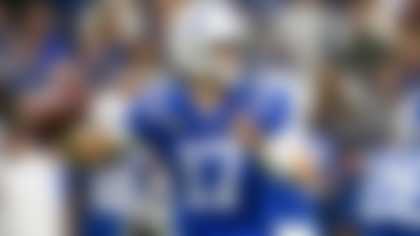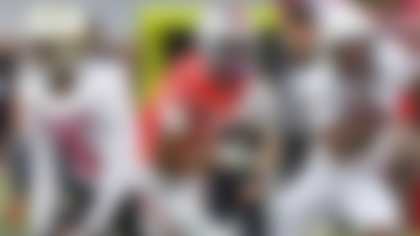GLENDALE, Ariz. -- "I can take a punch," Pete Carroll texted me late Sunday night, nearly three hours after the conclusion of one of the greatest Super Bowls ever played -- and about 170 minutes removed from one of the most universally reviled play calls in the history of football.
That's good, I thought to myself. Because you're about to get pummeled like a guy stepping into the ring against Mike Tyson in his prime.
The Seattle Seahawks coach and I were in the middle of an extended exchange that, via the wonders of modern technology, allowed us to delve deeper into a topic we'd first broached in the University of Phoenix Stadium locker room, where Carroll had walked around consoling some of his despondent stars. In the wake of a staggering 28-24 defeat to the New England Patriots in Super Bowl XLIX that elevated Tom Brady's legend to another level, virtually every Seahawks player I encountered was having trouble comprehending the sudden and stunning end to Seattle's season.
Fresh off a near-miraculous, four-bobble reception by Jermaine Kearse, the Seahawks had second-and-goal at the 1 with 26 seconds remaining. Seattle was 1 yard away from securing a second consecutive championship -- but instead of handing the rock to Marshawn Lynch, the most powerfulgoal-line runner in football, Carroll called a pass play, causing double-takes on his sideline and in living rooms and sports bars all over the football-watching world.
And when Russell Wilson's goal-line slant to Ricardo Lockettewas jumped and intercepted by Pats rookie Malcolm Butler, Carroll earned himself a lifetime's worth of second-guessing from aghast witnesses, some of them inside his own locker room.
When I asked receiver Doug Baldwin, in a quiet conversation near his locker, if he was shocked by Carroll's decision to throw, he shook his head and said, "Come on, man -- you've got common sense, too. ... We have nobody to blame but us. My first thought was that we were gonna run it in -- but coaches, they're the ones that they know it better than us."
Seattle linebacker Bruce Irvin was even more pointed, telling me, "We beat 'em, bro. We beat 'em. ... I'm speechless. Best back in the league, and the 1-yard-line? It wasn't even the 1 -- it was like half a yard. I will never understand that, bro. I will never understand it. I will never understand. ...
"When Jermaine caught that ball, I felt it was meant to be for us. Oh, no doubt -- we're gonna score. Beast Mode. Beast Mode! Best back on the (expletive) planet. That's crazy!"
So yes, like Lucy Ricardo, Carroll had some explaining to do. And he was certainly hurting when he returned my text and began detailing his logic, a gracious and commendable endeavor from a brilliant coach whose stirring journey I'd documented Sunday for NFL GameDay Morning, and a couple of days earlier on this website.
To Carroll's credit, he did so even while possessing a pretty clear idea that his perspective would get lost amid the noise -- a very legitimate fear, given human nature, the magnitude of the moment and the understanding that I had a column to write.
For every ounce of admiration and excitement I experienced for a valiant Patriots team that overcame a 10-point, fourth-quarter deficit, got an insanely clutch play by an undrafted rookie defensive back to capture the fourth championship of the Bill Belichick/Brady era and completed an incredible journey, I was equal parts sick for the Seahawks, who were literally 2 feet from a rousing repeat.
My sublime colleague Judy Battista handled the glorious side of that zero-sum equation.
I drew the What Was Pete Thinking? straw -- and while every synapse in my brain suspects that Carroll was overthinking the situation, I'm going to tell you what was going through his head.
"Really wish that guys that understand can teach why that situation happened!" Carroll texted. Before we go there, let's set the scene: The Pats had gone ahead by four on Brady's 3-yard touchdown pass to Julian Edelman with 2:02 remaining.
The Seahawks countered immediately, with Wilson finding Lynch on a beautiful over-the-shoulder sideline pass for a 31-yard gain. An 11-yard completion to Lockette on third-and-10 gave Seattle a first down at the Patriots' 38. Then, in a surreal play that caused bad flashbacks all over New England, Wilson went up top to Kearse who, despite tight coverage by Butler, stayed with and somehow managed to catch Wilson's pass while laying on his back -- on the fifth time he touched the ball.
Given that the Belichick/Brady Pats, after winning three championships in a four-year period that concluded a decade ago, subsequently lost a pair of Super Bowls to the New York Giants on the strength of unfathomably difficult catches (David Tyree, XLII; Mario Manningham, XLVI), the apparent completion of this tragic trifecta was too much for anyone associated with the Patriots to bear.
Carroll, with one remaining timeout, did the math and erred on the side of ensuring a maximum amount of chances to get the ball across the goal line while limiting the chances that the Pats would have enough time to counter.
On first-and-goal with one timeout from the 5, Lynch (24 carries, 102 yards) took a handoff to his left and powered inside the 1, and the notion of him not getting the ball again seemed unthinkable. Belichick, with two timeouts remaining, inexplicably elected to let the clock run down, simultaneously eschewing both the let them score on purpose strategy (which he'd employed against the Giants in Indy three Super Bowls ago) and the try to keep them out but save Brady as many seconds as possible tack.
Carroll saw a front stacked against a power run and a matchup he felt he could exploit with a short route against a rookie corner who had zero career interceptions. And he didn't want to run, get stopped short, burn his final timeout and be boxed into calling a pass on third down.
"You could run on 2nd down, call timeout, have to throw on third and score, or incompletion and have to choose (run or pass) on the final down," Carroll texted. "That's ball logic, not 2nd guess logic ... you never think you'll throw an interception there, just as you don't think you would fumble."
And yet: Wilson (12 for 21, 247 yards, two touchdowns), who'd thrown four interceptions in the Seahawks' stunning NFC Championship Game victory over the Green Bay Packers, served up the most painful pick of his short, luminous career. While Seahawks offensive coordinator Darrell Bevell complained in postgame interviews that Lockette "could have been stronger through the ball," give Butler credit for beating him to the spot.
"You see how he jumped it, though?" Irvin said to Seahawks linebacker Bobby Wagner as they stood at their adjacent lockers. "Like he knew it was coming."
As Carroll and I continued our late-night text conversation, I thought I knew what was coming -- until the coach made a point that, while not completely altering my perspective, at least got me thinking. He did it by referencing Wilson's 11-yard touchdown pass to Chris Matthews on a ball that was snapped with six seconds left in the first half, completing a five-play, 80-yard, 29-second drive (you read that correctly) that tied the game at 14 just before Katy Perry took over the field.
"The logic and reasoning (of the second-and-1 pass) is why you throw a TD pass with six seconds left in the half," Carroll said. "You've trained your players to do the right thing, and I trust them to do right."
OK -- I get that, at least.
As time passes, and the wounds become less acute, I suspect that many of Carroll's players will start to become open to viewing this painful and perplexing lost opportunity from a similar orientation. As for now? Too soon.
I'll spare you the numerous "What the (expletive) was he thinking?" mutterings I overheard from people in Seahawks uniforms and refrain from lending any legitimacy to the conspiracy theory one anonymous player was willing to broach: That Carroll somehow had a vested interest in making Wilson, rather than Lynch, the hero, and thus insisted on putting the ball in the quarterback's hands with an entire season on the line. "That's what it looked like," the unnamed player said, but I'd be willing to bet that he merely muttered it out of frustration, and that it was a fleeting thought.
I do believe this: The Seahawks remain a young, talented and relentless team, and Carroll will return next season as a highly popular coach who can work his motivational magic with a clear mandate for redemption. I wouldn't bet against him -- but I also know that he's going to beat himself up over this, over and over again.
"Ohhhhhhh yeah," he told me when we spoke in the locker room. "There'll be plenty of that." Fortunately, he can take a punch. We know this from past experience.
Earlier, Carroll had likened Sunday's disappointment to that which he endured while coaching USC in the 2006 Rose Bowl, when the Trojans suffered a heartbreaking 41-38 defeat to Texas that denied them a third consecutive national championship.
He bounced back from that, and he'll likely bounce back from Sunday's defeat, even as the chorus of severe second-guessing from people like yours truly reaches a crescendo and continues for the foreseeable future.
For now, like many Seahawks players, I believe Carroll should have handed the ball to Lynch on second-and-1, and I think that would have led to him hoisting the Lombardi Trophy and sucking down celebratory beers rather than engaging in a back-and-forth text exchange with a skeptical columnist.
That said, I get why Carroll made the call that he did, I respect him for his bravado and his convictions, and I love the fact that he'll hold his head high and continue to fight with everything he has, as evidenced by the short text he sent late Sunday night, one that I choose to include as the final words of the 2014 NFL season:
Always Compete!
Follow Michael Silver on Twitter @mikesilver.












